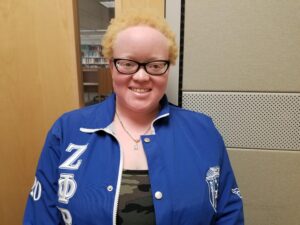
Albinism is a rare group of genetic disorders that can cause the skin, hair, or eyes of an individual to have little to no color. In the United States, the chances of a person being a carrier of the condition is about 1 in 18,000 to 20,000, according to “Albinism” by Rose Kivi and Matthew Solan.
Albinism is caused when a group of genes responsible for producing or distributing melanin result in the absence of melanin production. When the defective gene is passed down from both parents to their child, it leads to albinism.
Growing up, third year music performance major Angel Wallace knew she was different from others. Wallace has albinism that affects the pigmentation in her skin, hair and eyes.
“The type of albinism that I have affects my hair, skin and eye to where I have no melanin at all,” said Wallace. “The first time I can recall that I noticed that my skin was different from everyone was the way that people treated me once I began the first and second grade.”
Growing up, Wallace faced challenges being an albino and dealt with ignorant comments based on a lack of understanding. Yet, in the midst of it all, Wallace did not let their negativity affect her work ethic.
“I know that people treat me differently or sometimes look at me differently because of my albinism and think that I may not be able to complete certain tasks or participate because of it,” said Wallace. “I don’t allow my skin color, my eyesight, things like that, to hinder my work ethic.”
Similar to Wallace, senior criminal justice major GaKia Baker doesn’t let her albinism prevent her from doing what she wants to do.
“I was built for the career field I’m going into,” Baker said.
Baker is diagnosed with albinism as well, but unlike Wallace, Baker did not face hardships growing up when it came to her skin condition.
“ I wasn’t treated differently, I was treated normal. For me, it’s all about adapting. I adapt to the situations I’m put into, so I do still have challenges, but I adapt to the conditions and make them work for me,” said Baker.
Wallace’s and Baker’s albinism affects their eyesight and skin sensitivity. Due to these symptoms, they make sure to take extra precautions to take care of themselves.
“I’ve lived with low vision my entire life, and I adapted. My vision does not bother me. I have glasses for the days that my allergies cause my eyes to swell, but that’s the only time they’re needed,” Baker said.
Wallace and Baker have both caught the curiosity and attention of children due to their skin tone.
“A child’s curiosity has always made me laugh. I told one child what albinism was and she basically compared me to an inside-out Oreo – I was white on the outside and black on the inside,” Wallace said.